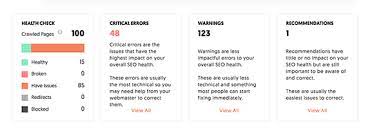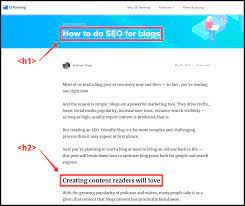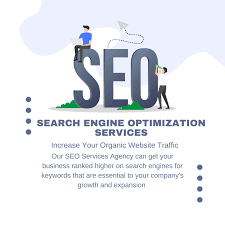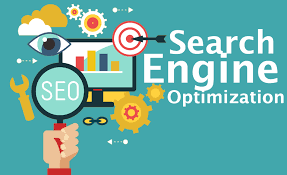Unlocking Success: The Power of SEO Site Analysis in Enhancing Your Website’s Performance
The Importance of SEO Site Analysis
SEO site analysis is a crucial process in the world of digital marketing. It involves evaluating various aspects of a website to determine its search engine optimisation (SEO) performance and identify areas for improvement. By conducting a comprehensive site analysis, businesses can gain valuable insights into how well their website is performing in terms of visibility, user experience, and overall SEO health.
Key Benefits of SEO Site Analysis:
- Identifying Technical Issues: Through site analysis, SEO experts can uncover technical issues that may be hindering the website’s performance on search engines. This includes identifying broken links, slow page speed, mobile-friendliness issues, and more.
- Evaluating Keywords and Content: Analysing the keywords used on the website and assessing the quality of content helps in determining if the site is effectively targeting relevant search queries. This step is essential for improving organic search rankings.
- Assessing Backlink Profile: Examining the backlink profile of a website helps in understanding its authority and credibility in the eyes of search engines. A strong backlink profile can significantly impact a site’s SEO performance.
- Enhancing User Experience: Site analysis also involves evaluating user experience factors such as navigation, site structure, and overall usability. Improving these aspects can lead to higher engagement and better rankings on search engine results pages.
- Competitor Analysis: By comparing your site with competitors through SEO analysis, you can identify opportunities for growth and stay ahead in the competitive digital landscape.
Conclusion
In conclusion, SEO site analysis plays a vital role in helping businesses improve their online visibility and drive organic traffic to their websites. By regularly conducting thorough site analyses and implementing necessary changes based on the findings, businesses can enhance their SEO performance and achieve better results in search engine rankings.
Essential FAQs on SEO Site Analysis: Understanding Its Importance, Tools, and Key Elements
- What is SEO site analysis?
- Why is SEO site analysis important for my website?
- How often should I conduct SEO site analysis?
- What tools can I use for SEO site analysis?
- What are the key elements analysed in an SEO site analysis?
- How can technical issues impact SEO performance?
- What role does keyword analysis play in SEO site analysis?
- Why is backlink evaluation essential in SEO site analysis?
- How can user experience affect the results of an SEO site analysis?
What is SEO site analysis?
SEO site analysis is a fundamental process in the realm of digital marketing that involves a comprehensive evaluation of a website’s performance and structure from an SEO perspective. This analysis delves into various aspects such as technical elements, content quality, keyword targeting, backlink profile, and user experience to assess how well the site is optimized for search engines. By conducting SEO site analysis, businesses can gain valuable insights into their website’s strengths and weaknesses, identify areas for improvement, and develop strategic plans to enhance their online visibility and organic search rankings.
Why is SEO site analysis important for my website?
Understanding the importance of SEO site analysis for your website is crucial in achieving online success. Conducting a thorough SEO site analysis provides valuable insights into the performance of your website, helping you identify technical issues, evaluate keyword effectiveness, assess backlink quality, enhance user experience, and stay ahead of competitors. By investing time and resources in SEO site analysis, you can make informed decisions to improve your website’s visibility, attract more organic traffic, and ultimately boost your search engine rankings. In today’s competitive digital landscape, leveraging the power of SEO site analysis is essential for maximising the potential of your website and driving sustainable growth.
How often should I conduct SEO site analysis?
Regularly conducting SEO site analysis is essential for maintaining and improving the performance of your website in search engine results. The frequency of conducting site analysis can vary depending on various factors such as the size of your website, the level of competition in your industry, and the rate of changes in search engine algorithms. As a general guideline, it is recommended to conduct a comprehensive SEO site analysis at least once every quarter to ensure that your website remains optimised for search engines and continues to meet the evolving demands of users and search engines alike. By monitoring and analysing your site regularly, you can identify issues promptly, make necessary adjustments, and stay ahead in the dynamic world of digital marketing.
What tools can I use for SEO site analysis?
When it comes to conducting SEO site analysis, there are several tools available that can assist in evaluating and improving the performance of your website. Popular tools for SEO site analysis include Google Analytics, Google Search Console, SEMrush, Ahrefs, Moz Pro, and Screaming Frog. These tools offer a range of features such as keyword research, backlink analysis, technical SEO audits, and performance tracking to help you identify areas for improvement and enhance your overall SEO strategy. By utilising these tools effectively, you can gain valuable insights into your website’s SEO health and make informed decisions to boost your online presence.
What are the key elements analysed in an SEO site analysis?
When conducting an SEO site analysis, several key elements are scrutinised to evaluate the website’s overall search engine optimisation performance. These elements typically include technical aspects such as site speed, mobile-friendliness, and URL structure. Additionally, keywords and content quality are analysed to ensure alignment with relevant search queries. The backlink profile is assessed to gauge the site’s authority and credibility in the eyes of search engines. User experience factors like navigation and site structure are also evaluated for optimal engagement. By examining these critical elements comprehensively, businesses can identify areas for improvement and implement strategies to enhance their SEO effectiveness.
How can technical issues impact SEO performance?
Technical issues can have a significant impact on SEO performance as they can hinder a website’s ability to be properly crawled and indexed by search engines. Issues such as broken links, slow page speed, improper use of meta tags, and mobile-friendliness can all negatively affect a site’s visibility in search engine results. Search engines prioritise websites that provide a seamless user experience, and technical issues can lead to poor user experience, resulting in lower rankings. Addressing technical issues through thorough SEO site analysis is crucial to ensure that a website is optimised for search engines and able to achieve higher organic traffic and better search engine rankings.
What role does keyword analysis play in SEO site analysis?
Keyword analysis plays a pivotal role in SEO site analysis by helping businesses understand the search terms their target audience uses to find relevant content. By analysing keywords, businesses can identify high-value keywords with strong search volume and low competition, allowing them to optimise their website content accordingly. This process not only improves the site’s visibility in search engine results but also enhances its relevance to users’ search queries, ultimately driving organic traffic and improving overall SEO performance.
Why is backlink evaluation essential in SEO site analysis?
Backlink evaluation is essential in SEO site analysis as backlinks serve as a key indicator of a website’s authority and credibility in the eyes of search engines. By assessing the quality and quantity of backlinks pointing to a site, SEO experts can gauge its overall reputation and relevance within its industry. High-quality backlinks from reputable sources can significantly boost a website’s search engine rankings, while spammy or irrelevant backlinks can have a negative impact. Understanding and analysing the backlink profile of a website allows businesses to identify opportunities for improvement, build a strong link portfolio, and ultimately enhance their SEO performance for better visibility and organic traffic.
How can user experience affect the results of an SEO site analysis?
User experience plays a pivotal role in the outcomes of an SEO site analysis. A website that offers a seamless and intuitive user experience is more likely to rank higher in search engine results. Factors such as site speed, mobile responsiveness, ease of navigation, and engaging content all contribute to a positive user experience. Search engines like Google consider these aspects when determining the relevance and credibility of a website, ultimately impacting its SEO performance. By prioritising user experience in SEO site analysis, businesses can enhance their online visibility, increase user engagement, and improve their overall search engine rankings.




